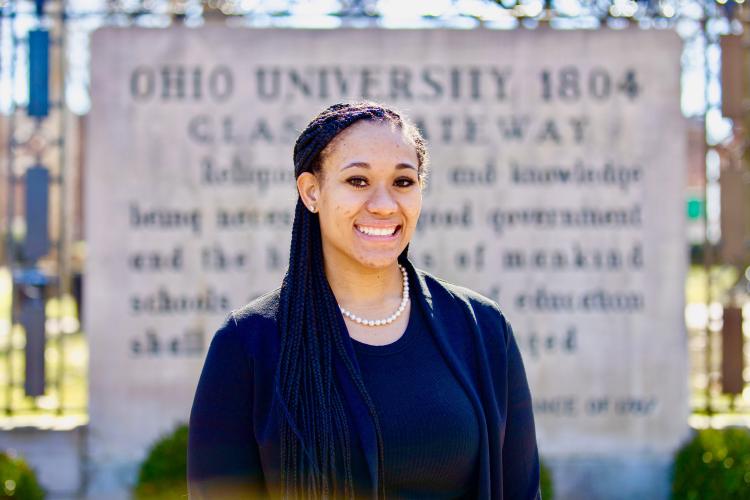

Alexandria Madry always knew she wanted to be a nurse. She also realized that she wanted to join Ohio University’s School of Nursing after learning of the school’s high NCLEX (the premier Nurse licensure exam) pass rate and national reputation.
From the moment she set foot on campus, Madry was sure that OHIO was the place she wanted to call home.
“I was blown away by the architecture and the wildlife,” Madry recalled.
Madry, an OHIO senior from Dublin, Ohio, said that she’s made numerous lasting memories during her time on campus. However, her favorite OHIO memory, and her legacy, will forever be leading the creation of the Multicultural Student Nurses Association – a student organization that is helping minority nursing students feel more connected and interact with faculty in an informal setting.
Madry said that her desire to form the Association began soon after she arrived at OHIO and noticed a lack of individuals who looked like her. As time went on, Madry also learned of the pre-Nursing program’s low multicultural student retention rates.
“This was something I found myself talking about all the time, so I decided to do something about it,” Madry said. “It can be very hard to focus on your academics when you feel like no one can relate to you. In such a challenging profession, like nursing, you must have a community to support you.”
For Madry, her desire to find community led her to build community; in 2019, she spearheaded the creation of the Multicultural Student Nursing Association. Today, the organization has eight active members.
“It is always my goal to leave things better than I found them,” Madry said. “To me, diversity, equity and inclusion means that everyone has the right to the same opportunities, to feel safe in their community, be able to express their genuine selves without fear of judgment and have chances to understand the viewpoints and cultures of others.”
Madry said she hopes that the Multicultural Student Nursing Association will not only continue to foster a supportive, connected environment for OHIO’s minority Nursing students but also help to further the conversations taking place across the University about diversity, inclusion and equity.
Such discussions, although not always easy, are forever important.
“It is imperative before having these conversations (about diversity, equity and inclusion) to realize that everyone has their perspective, even if they share a similar identity. Failing to realize this causes stereotypes and can invalidate the experiences of others. Just because I am a black woman, does not mean that my experiences speak for all black women. Therefore, it is important to understand intersectionality as well,” Madry said. “These discussions are important to help bridge the gap that we see between races, religions and sexual orientation. But, at the end of the day, if you don't enter these spaces with an open mind and a will to be an ally, you can cause more harm than good.”
Madry stated that, beyond OHIO’s campus, it’s imperative for all of us to continue to work together to transform diversity, equity and inclusion discussions into tangible actions that will positively move the world forward. However, she also noted that not all diversity-focused actions are created equal, and sometimes a plan or effort that might look good on paper often ends up making no real diversity impact.
“Attempting to improve diversity in a space can often come off forced and result in a plan without an effective goal. They may mean well, but there is no lasting effect,” Madry said. “To create a community of diversity, inclusion and equality, you must go directly to the people whom it will affect the most.”

